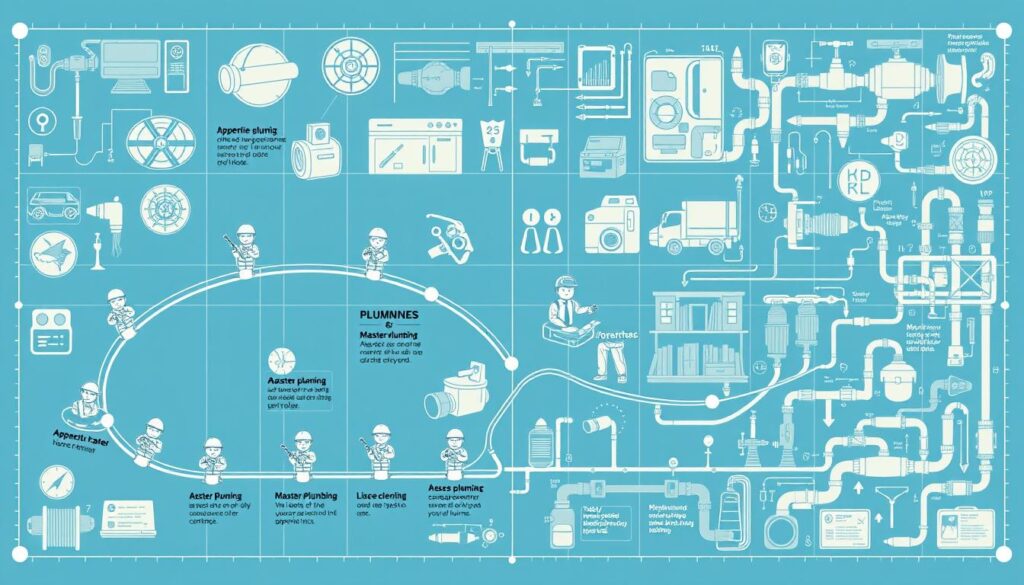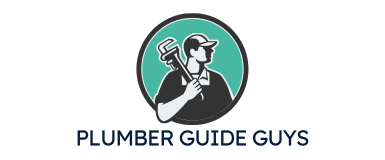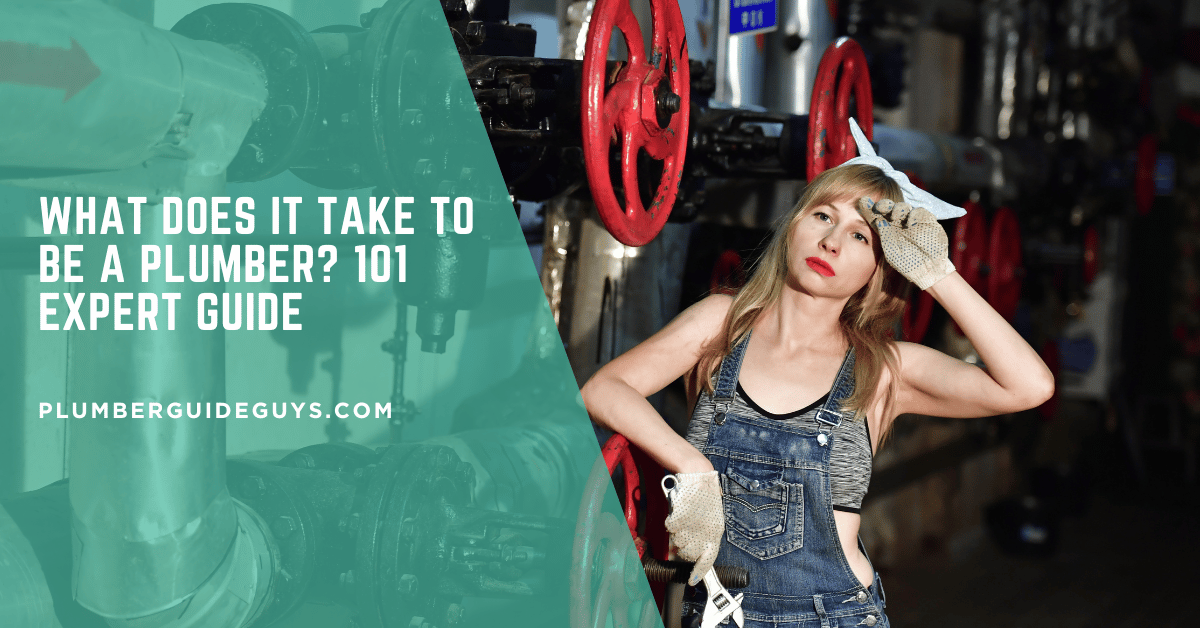Affiliate Disclosure
Plumber Guide Guys is a participant in the Amazon Services LLC Associates Program, an affiliate advertising program designed to provide a means for sites to earn advertising fees by advertising and linking to Amazon.
What Does It Take to Be a Plumber? Ever thought about turning a love for solving problems into a plumbing career? Plumbing is more than fixing pipes. It’s mastering a key trade that keeps our communities going.

To be a plumber, you need more than just technical skills. This job requires dedication, specialized knowledge, and a mix of physical and mental abilities. It’s not just about using a wrench.
In the U.S., plumbers are vital for keeping our infrastructure, public health, and water systems safe. Becoming a professional plumber is both tough and fulfilling.
Key Takeaways
- Plumbing is a complex trade requiring specialized technical skills
- Physical fitness and problem-solving abilities are key
- Apprenticeship programs offer vital hands-on training
- Continuous learning is essential for success
- Plumbing offers stable jobs and good pay
Table of Contents
Understanding the Plumbing Trade Fundamentals
Starting a career in plumbing means learning about complex systems. These systems keep our homes and businesses working well. You’ll learn about pipes, fixtures, and infrastructure that handle water and waste.
Plumbing is more than just pipes. It’s a detailed craft that needs technical skills and problem-solving. To get good at the plumber certification process, you must know the key parts of plumbing systems.
Core Plumbing System Components
- Water supply lines
- Drainage systems
- Waste removal networks
- Ventilation pipes
- Fixture connections
Essential Technical Knowledge Requirements
Good plumbers understand fluid dynamics and pressure systems well. Your technical knowledge will cover:
- Pipe material properties
- Pressure calculation techniques
- Water flow management
- System design principles
Basic Mathematics and Physics Skills
Mathematical precision is key in plumbing. You’ll need to be good at:
- Measurement calculations
- Geometry for pipe fitting
- Trigonometry for complex installations
- Understanding hydraulic principles
“In plumbing, every measurement counts. A fraction of an inch can make the difference between a perfect installation and a disaster.” – Professional Plumbing Instructor
Building these basic skills will help you become a skilled plumber. You’ll be ready to face the plumbing industry’s challenges.
Educational Requirements and Training Paths
Choosing the right educational path is key for those wanting to be plumbers. Plumbing vocational programs offer many training options. These can lead to a successful career, with choices from short-term certificates to two-year degrees.
Your plumbing journey starts with picking the right education. Plumbing apprenticeship requirements differ, but most include:
- Technical classroom instruction
- Hands-on practical training
- Safety protocol education
- Blueprint reading skills
Community colleges and trade schools offer plumbing programs lasting 6 months to 2 years. These programs mix theory with practical skills. They prepare you for entry-level jobs in plumbing.
Important parts of plumbing apprenticeship requirements are:
- Minimum age of 18
- High school diploma or equivalent
- Basic mathematics and science understanding
- Physical fitness for trade work
Pro tip: Many successful plumbers suggest starting with a vocational program. This helps build a strong foundation in technical skills before an apprenticeship.
What Does It Take to Be a Plumber: Skills and Qualifications
To become a licensed plumber, you need more than just technical skills. It’s about combining physical strength, mental sharpness, and professional qualities. Knowing what it takes to be a plumber today is key.
Physical Requirements and Abilities
Being a plumber is tough work that needs lots of strength and stamina. You must be ready for hard environments. Important physical traits include:
- Upper body strength for lifting heavy equipment
- Flexibility to work in tight spaces
- Good hand-eye coordination
- Stamina to work long hours in various conditions
Problem-Solving and Technical Aptitude
Great plumbers are excellent at solving problems. Your technical skills are key to fixing complex plumbing issues. This means:
- Analyzing complex pipe systems
- Spotting structural problems
- Coming up with creative fixes
- Understanding complex mechanical systems
Communication and Customer Service Skills
Being good at plumbing isn’t just about technical skills. You also need to be great at talking to people. Good communication builds trust with clients. Your skills should include:
- Clear explanations of technical issues
- Professional interactions with customers
- Listening to client concerns
- Providing clear cost estimates
By mastering these skills, you’ll stand out in the plumbing world. You’ll go from being a basic technician to a highly sought-after expert.
Plumbing Apprenticeship Program Overview

Starting a plumbing apprenticeship opens the door to a fulfilling career in the trades. Most new plumbers join these programs right after high school. It’s the first step towards a promising career.
These programs last 4-5 years. They mix classroom learning with real-world experience. You’ll learn the skills needed to become a skilled plumber.
- Classroom learning covers technical skills and theoretical knowledge
- Supervised on-the-job training provides real-world experience
- Approximately 2,000 hours of paid work experience per year
- Direct mentorship from experienced professional plumbers
Your apprenticeship will include key learning areas:
- Blueprint reading and technical drawing
- Pipe system installation techniques
- Safety protocols and workplace regulations
- Advanced mathematical calculations for plumbing projects
Plumbing apprenticeship requirements vary by state, but most programs demand a combination of classroom education and practical training. You’ll need a high school diploma or equivalent. Also, you must be at least 18 years old with a valid driver’s license.
“An apprenticeship is your pathway to mastering the plumbing trade, combining education and practical experience.” – Professional Plumbers Association
Licensing and Certification Requirements
Understanding the plumber certification process is key to your success. Each state has its own rules for becoming a licensed plumber. It’s important to know what your state requires.
State-Specific Licensing Requirements
Your journey to becoming a plumber starts with meeting state rules. States have different rules, but they often follow a similar pattern:
- Complete a state-approved apprenticeship program
- Pass a licensing exam
- Show proof of work experience
- Submit a background check and documents
Continuing Education Demands
To keep your license, you must keep learning. Most states require continuing education credits. These help plumbers stay up-to-date with:
- New building codes
- Latest technology and methods
- Safety rules
- Environmental standards
Professional Certification Options
There are more ways to show your skills beyond basic licensing. Specialized certifications can boost your career.
“Professional certifications are your pathway to career advancement in the plumbing industry.” – National Plumbing Association
Look into certifications from groups like the Plumbing-Heating-Cooling Contractors Association. They can set you apart in the competitive plumbing field.
Essential Tools and Equipment for Plumbers
Building a professional toolkit is key for success in plumbing. Plumbing tools and equipment are the basics of your trade. They help you solve many repair and installation problems quickly.
Your basic plumbing tools and equipment should include several key categories:
- Hand Tools
- Adjustable wrenches
- Pipe wrenches
- Pliers (needle-nose and channel-lock)
- Hacksaw
- Tubing cutter
- Diagnostic Equipment
- Pipe inspection camera
- Leak detection device
- Pressure testing kit
- Specialized Plumbing Equipment
- Pipe threading machine
- Drain snake
- Pipe bender
Investing in top-notch plumbing tools and equipment is worth it. They make your work faster, reduce problems on the job, and show you care about your work.
Remember: Quality tools are an investment in your professional reputation.
As you grow in your plumbing career, keep updating your toolkit. Start with the basics and add more as your work needs change.
Career Advancement and Specialization Options
Your plumbing career path is full of exciting opportunities. As you move from apprentice to journeyman, you’ll find many ways to grow and earn more.
To advance in plumbing, you need a plan and to keep learning. The journey to becoming a master plumber is a big step in your career.
Master Plumber Path
Becoming a master plumber involves several key steps:
- Complete a minimum of 4-5 years as a journeyman plumber
- Accumulate extensive work experience in various plumbing systems
- Pass rigorous state-level master plumber certification exams
- Demonstrate advanced technical and management skills
Specialized Areas in Plumbing
Your plumbing career can lead to many specializations:
- Commercial Plumbing: Large-scale building systems
- Industrial Plumbing: Complex manufacturing environments
- Green Technology Plumbing: Sustainable water and energy solutions
- Medical Gas Systems: Specialized healthcare infrastructure
Business Ownership Opportunities
Master plumber education sets you up for starting your own business. Starting a plumbing business needs careful planning, including:
- Obtaining necessary business licenses
- Developing a solid business and marketing strategy
- Building a reliable professional network
- Investing in quality tools and equipment
Your dedication to learning and improving will shape your plumbing career.
Salary Expectations and Job Market Outlook

Exploring a plumbing career path reveals exciting financial opportunities for skilled professionals. The job market for plumbers continues to show robust growth. This makes it an attractive trade for those wondering what does it take to be a plumber.
Salary ranges vary widely depending on experience, specialization, and location. Entry-level plumbers typically start around $35,000 annually. Experienced professionals can earn significantly more.
| Plumber Level | Average Annual Salary | Potential Earnings Range |
|---|---|---|
| Apprentice | $30,000 – $40,000 | Starting wage with on-the-job training |
| Journeyman | $50,000 – $70,000 | Increased earnings with specialized skills |
| Master Plumber | $70,000 – $100,000+ | Top-tier earnings with advanced expertise |
Key factors influencing plumbing salaries include:
- Geographic location
- Specialized certifications
- Years of experience
- Additional technical skills
The U.S. Bureau of Labor Statistics projects a 10% growth in plumbing jobs through 2028. This is faster than many other occupations. Urban areas and regions with significant construction activity offer the most promising opportunities for plumbers.
Skilled plumbers who invest in continuous learning and specialize in complex systems can command top-tier salaries in the marketplace.
Your plumbing career path can be lucrative. This is when you combine technical expertise, ongoing education, and a commitment to professional development.
Conclusion
Starting a plumbing career needs dedication, skill, and always learning more. It’s not just about knowing how to fix pipes. You also need hands-on training, problem-solving skills, and a drive to grow professionally.
Trade schools are a great way to kickstart your plumbing career. They offer practical skills, help you meet other professionals, and prepare you for exams. You’ll learn through apprenticeships, technical classes, and real-world experience.
The plumbing field offers many chances to move up. You can work on homes, buildings, or even industrial systems. Plumbers are not just fixers; they solve big problems and help communities.
Your plumbing career will grow if you keep learning, stay current with new tech, and work hard. Whether you want to be a top plumber or start your own business, what you learn now will shape your future. This career is both challenging and rewarding.
FAQ
How long does it take to become a fully licensed plumber?
What educational background do I need to start a plumbing career?
How physically demanding is a plumbing career?
What are the typical costs associated with plumbing training?
How long does it take to become a fully licensed plumber?
What educational background do I need to start a plumbing career?
How physically demanding is a plumbing career?
What are the typical costs associated with plumbing training?
FAQ
How long does it take to become a fully licensed plumber?
It takes 4-5 years to become a fully licensed plumber. This includes 4-5 years of apprenticeship and passing licensing exams. You’ll learn in classrooms and on the job, gaining practical skills from experienced plumbers.
What educational background do I need to start a plumbing career?
You need a high school diploma or GED to start. Then, you can take vocational training at community colleges or technical schools. This training gives you the technical knowledge and hands-on skills needed.
How physically demanding is a plumbing career?
Plumbing is very physically demanding. You need strength, flexibility, and endurance. You’ll work in tight spaces, lift heavy equipment, and stand for long hours. Being physically fit is key to success.
What are the typical costs associated with plumbing training?
Training costs vary. Community college programs cost
FAQ
How long does it take to become a fully licensed plumber?
It takes 4-5 years to become a fully licensed plumber. This includes 4-5 years of apprenticeship and passing licensing exams. You’ll learn in classrooms and on the job, gaining practical skills from experienced plumbers.
What educational background do I need to start a plumbing career?
You need a high school diploma or GED to start. Then, you can take vocational training at community colleges or technical schools. This training gives you the technical knowledge and hands-on skills needed.
How physically demanding is a plumbing career?
Plumbing is very physically demanding. You need strength, flexibility, and endurance. You’ll work in tight spaces, lift heavy equipment, and stand for long hours. Being physically fit is key to success.
What are the typical costs associated with plumbing training?
Training costs vary. Community college programs cost $1,000 to $5,000. Apprenticeships are often free or paid. Vocational school training can cost $3,000 to $15,000. Many apprentices earn while they learn, reducing costs.
Do I need special certifications to work as a plumber?
Yes, most states require plumbers to be licensed. You need to pass an exam that tests your knowledge and skills. Special certifications are also available for areas like green plumbing. These can improve your job prospects.
What is the typical career progression for a plumber?
The career path starts as an apprentice. After 4-5 years, you become a journeyman plumber. With more experience, you can become a master plumber. Some plumbers start their own businesses or specialize in certain areas.
What tools do I need to start my plumbing career?
You’ll need tools like pipe wrenches, adjustable wrenches, and pliers. You’ll also need pipe cutters, thread sealing tape, and a hacksaw. Apprenticeship programs provide a list of tools needed. Many employers help with tool costs.
How stable is the job market for plumbers?
The plumbing job market is very stable. The Bureau of Labor Statistics predicts a 5-7% growth rate through 2030. There’s always a need for skilled plumbers in residential, commercial, and industrial sectors.
Can I specialize in a specific type of plumbing?
Yes, you can specialize in areas like residential services or commercial plumbing. Specialization requires more training and certifications. But it can lead to higher pay and focused career opportunities.
What are the typical salary ranges for plumbers?
Salaries vary by experience and location. Apprentices start at $30,000-$40,000. Journeyman plumbers earn $50,000-$70,000. Master plumbers or those with specialized skills can earn $75,000-$100,000 or more. Overtime and business ownership can increase earnings.
,000 to ,000. Apprenticeships are often free or paid. Vocational school training can cost ,000 to ,000. Many apprentices earn while they learn, reducing costs.
Do I need special certifications to work as a plumber?
Yes, most states require plumbers to be licensed. You need to pass an exam that tests your knowledge and skills. Special certifications are also available for areas like green plumbing. These can improve your job prospects.
What is the typical career progression for a plumber?
The career path starts as an apprentice. After 4-5 years, you become a journeyman plumber. With more experience, you can become a master plumber. Some plumbers start their own businesses or specialize in certain areas.
What tools do I need to start my plumbing career?
You’ll need tools like pipe wrenches, adjustable wrenches, and pliers. You’ll also need pipe cutters, thread sealing tape, and a hacksaw. Apprenticeship programs provide a list of tools needed. Many employers help with tool costs.
How stable is the job market for plumbers?
The plumbing job market is very stable. The Bureau of Labor Statistics predicts a 5-7% growth rate through 2030. There’s always a need for skilled plumbers in residential, commercial, and industrial sectors.
Can I specialize in a specific type of plumbing?
Yes, you can specialize in areas like residential services or commercial plumbing. Specialization requires more training and certifications. But it can lead to higher pay and focused career opportunities.
What are the typical salary ranges for plumbers?
Salaries vary by experience and location. Apprentices start at ,000-,000. Journeyman plumbers earn ,000-,000. Master plumbers or those with specialized skills can earn ,000-0,000 or more. Overtime and business ownership can increase earnings.

